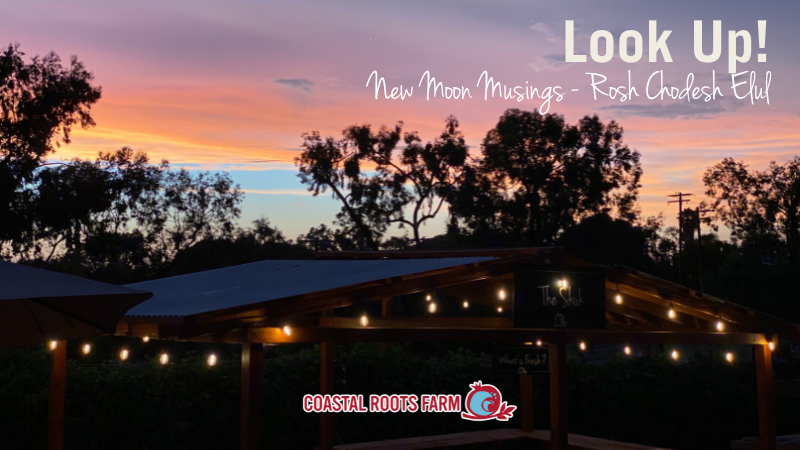Welcoming the Hebrew Month at Coastal Roots Farm
By Cantor Rebecca Joy Fletcher, Director of Jewish Life
Elul and the Jewish Ecological Calendar
At Coastal Roots Farm, we honor Rosh Chodesh, the new moon marking each Jewish month, as a sacred rhythm aligned with the land, the spirit, and our shared responsibility for both. Our monthly series, New Moon Musings, is a space to pause, reflect, and reconnect—with the seasons, with Jewish wisdom, and with the Earth.
As we greet Rosh Chodesh Elul 2025 (beginning Saturday night, August 23 and continuing through Monday night, August 25), we step into a month of introspection, relationship, and repair. Elul is traditionally a time of cheshbon nefesh (soul-accounting), preparing us for the High Holidays of Rosh Hashanah and Yom Kippur. It’s a spiritual threshold inviting return—to self, to one another, to tne natural world, and to the Source of all life.
What Happens in the Month of Elul?
In rabbinic tradition, Elul is linked to the verse from Song of Songs: “Ani L’dodi V’dodi Li – I am my beloved’s, and my beloved is mine.”
This verse encapsulates the essence of Elul: relationship. Whether between people, between humanity and the Divine, or between humans and the Earth, repair happens through reconnection. The work of Elul is not just about repentance—it’s about intimacy. It's about softening what’s hardened, turning toward what we love, and remembering that love is the ground from which all meaningful action grows.
A Season for Tender Courage
This year, Elul arrives in the shadow of global pain: the suffering of the Israeli hostages and their families, the humanitarian crisis across Gaza, the moral strain and increased antisemitism felt by Jews around the world. These griefs are real and complex. In times like this, it may feel easier to close our hearts. But Elul gently asks us to do the opposite: to turn our hearts toward each other, even amid heartbreak.
In Jewish tradition, this process is called teshuvah (return). Teshuvah can mean admitting a moral wrong, offering an overdue apology, reconnecting with prayer, acts of loving kindness, or community. But it can also mean turning back toward the Earth.
Among other things, the climate crisis is a spiritual crisis. At its root, the grief we carry for the planet is grief born of love. We ache because we care. The more we remember that love, the more courage we find—not just to mourn, but to act.
Cultivating Earth: Love in Elul
At Coastal Roots Farm, we invite you to nurture that love in simple, grounded ways:
- Befriend a tree. Sit quietly and listen to what it knows.
- Take a ten-minute “Halleluyah walk,” looking only for beauty.
- Pause before you eat. Compost with care.
- Volunteer with us, share food with a neighbor, or donate to support farmers and food justice.
- Do small acts with great love.
Honoring a Teacher: Joanna Macy z”l
This Elul also brings remembrance. Environmental activist and visionary Joanna Macy (1929–2024) passed at age 96 on July 19, 2025, leaving behind a legacy of spiritual ecology. The eco-spiritual system she created, The Work That Reconnects, invites us to face planetary grief, renew our sense of belonging, and act from love.
Her teachings mirror Elul’s message: turn toward what you love, and let that love guide you forward.
Closing Blessing: Returning with Patience and Urgency
Elul is a month long for a reason—because real teshuva is not an on/off switch. However, if we do not step forward into teshuva with energy and fervor, it will never happen at all. So let us each approach this Elul with patience, but also with urgency, so that we can return— not just to ourselves and to our people, but to the belovedness of all life.
Let us turn back in love, so we can move forward in strength.
